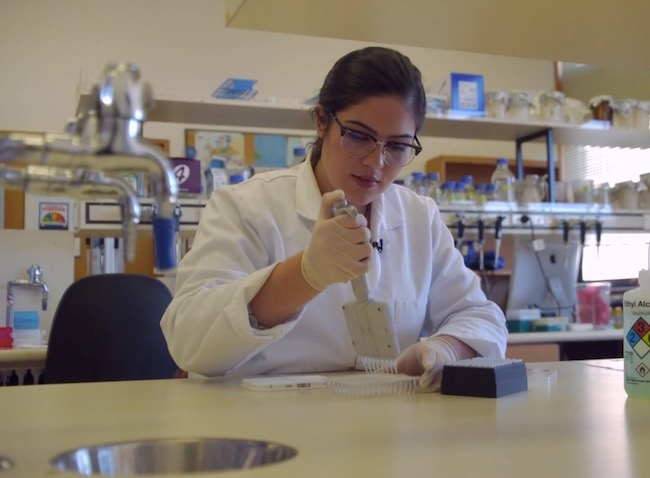
Anežka Hoskin is working with Māori and New Zealand based Pacific Islanders furthering genetic mātauranga (knowledge) on metabolic diseases that influence obesity.
It was a strong relationship nurtured between a Biochemistry Otago Professor and an East Coast iwi that first drew Anežka Hoskin to Dunedin.
“Professor Tony Merrimen was looking for a young Ngāti Porou genetics researcher and I wanted every opportunity to reconnect with my iwi and whānau,” Anežka says.
Her decision to move to Otago was also greatly influenced by the opportunity to work with an established Māori scientist, Dr Phillip Wilcox.
When I arrived I was further encouraged by the amount of support and opportunities available to Māori students, she adds.
Now halfway through her Master of Science in Genetics, Anežka is working with Ngāti Porou Hauroa and the wider Polynesian community furthering genetic mātauranga (knowledge) on metabolic diseases that influence obesity.
Using data collected for both Māori and New Zealand based Pacific Islanders, the research is taking a genome wide approach to identify people who may be at higher risk from diseases such as gout and Type 2 diabetes.
The research starts by sequencing certain parts of participants DNA and statistical tests are then used to find parts of the human genome that affect these types of disease.
“We know that aspects of these conditions do have a genetic predisposition, and this research will help destigmatise them by highlighting they are not the fault of effected individuals.”
“The focus can then shift away from the whakamā (shame) associated with having these types of disease and instead to their treatment.”
To help reduce the whakamā that can come with these conditions, Anežka recognises a significant part of the research is education and communicating it in the right way to people who can use it in their everyday lives.
Māori TV's Native Affairs programme recently showcased her research, and Anežka also presented her work at the Ira Rangahau Māori workshop in Dunedin, the first of its kind conceived by Dr Phillip Wilcox and supported by Genetics Otago.
“Often I hear people saying genetics is irrelevant to Māori, but all the presenters were Māori and they highlighted the use of genetics across a range of industries like agriculture, forestry, healthcare and the environment, so genetics is relevant for absolutely everyone.”
“As a rangatahi (young) Māori, seeing people in industry also showed me the amazing opportunities available for genetics tauira (students).”
“Being engaged with this study has strengthened my ability to connect back to the area that's an important part of my whakapapa.”
Anežka's whaea (mother) is Ngāti Porou who moved to Gisborne several years ago, allowing the postgraduate student to reconnect with the region before her research.
However she says being engaged with this study has strengthened her ability to connect back to the area that's an important part of her whakapapa.
“As my heritage is with Ngāti Porou it's a huge personal journey as well as great for my career.”
“I also get to live in my grandfather's house over the summer, spend time with my wider whanau, and do my research which is ultimately giving back to them and the wider community.”






